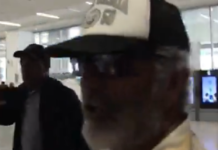The GOP-controlled House majority continues to present evidence suggesting the potential weaponization of the federal law enforcement system against the American public.
In a recent Twitter thread, Representative Jim Jordan (R-Ohio), who leads the House Judiciary Select Subcommittee on the Weaponization of the Federal Government, disclosed that FBI Special Agent Elvis Chan appeared to have given false statements under oath regarding the Bureau’s handling of the Hunter Biden laptop story before the 2020 presidential election, as reported by the Daily Caller.
During the lead-up to the 2020 presidential election, Chan played a central role as the main intermediary between the FBI’s Foreign Influence Task Force (FITF) and various social media platforms. According to materials revealed by Jordan, it seems that Chan provided misleading testimony about his interactions with technology companies concerning the Hunter Biden laptop.
“FBI Special Agent made false statements in testimony about the FBI’s role in the suppression of the Hunter Biden laptop story,” Jordan tweeted, referring to internal FBI documents.
Making false statements under oath during congressional testimony constitutes a felony under U.S. statutes.
Laura Dehmlow, the current head of the FITF Section, confirmed that she and Chan organized a meeting with Facebook officials on October 14, 2020, to discuss the then-recently broken Hunter Biden laptop story by the New York Post. Dehmlow disclosed this information while testifying before Jordan’s committee in July.
When asked about the credibility of the materials found on Hunter Biden’s laptop, the FBI declined to comment. Dehmlow clarified that this response aligned with guidance from an unnamed FBI representative during internal discussions about the laptop. The FBI was already aware of the laptop’s authenticity and that it wasn’t tied to Russian propaganda before The Post’s coverage.
“Did Dehmlow know that the FBI had the laptop and it was real? Yes. Did other key members of the FBI’s Foreign Influence Task Force know? Yes. The FBI knew the laptop was real and yet decided it would say ‘no comment,'” Jordan stated.
During his testimony in the Missouri vs. Biden censorship lawsuit, a case initiated by Republican Attorneys General from Missouri and Louisiana, Chan asserted that he was confident in not having participated in any additional meetings with tech firms regarding the laptop apart from the one mentioned earlier.
However, an internal Facebook document provided by Jordan contradicts this statement, showing that Chan had a “follow-up” meeting with Facebook officials on October 15, the day after the Hunter Biden story was censored and the FBI held its initial meeting with the social media platform.
Moreover, Jordan highlighted another inconsistency in Chan’s testimony. Chan claimed that he had “no internal knowledge” of the FBI’s Hunter Biden investigation. Yet, internal communications shared by Jordan demonstrated that Chan had informed Facebook about the ongoing FBI investigation into Hunter Biden.
“A Facebook employee stated on Oct. 15, 2020, that Chan had briefed them on the FBI’s stance and that there was no current evidence indicating foreign involvement in the leak,” Jordan noted.
THE FACEBOOK FILES PART 4. FBI LIED ABOUT MEETING WITH BIG TECH REGARDING NY POST’S HUNTER BIDEN LAPTOP STORY
Internal FB docs reveal that an FBI Special Agent made false statements in testimony about the FBI’s role in the suppression of the Hunter Biden laptop story
🧵 Thread:
— Rep. Jim Jordan (@Jim_Jordan) August 7, 2023
Chan was asked again if, other than the October 14 Facebook-FITF meeting, he was “aware of any communications between anyone at Facebook and anyone at the FBI related to the Hunter Biden laptop story?”
He answered: “No.” pic.twitter.com/bwHXU9DjpC
— Rep. Jim Jordan (@Jim_Jordan) August 7, 2023






